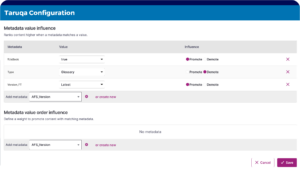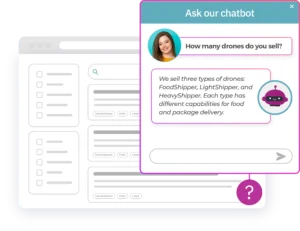“Understanding Semantic Search” is an ongoing series. This is the fourth and final post in this series. Don’t miss our previous articles breaking down how semantic search works, the evolution of search technology, and the three semantic search use cases you need to optimize productivity and customer service.
There’s no question, semantic search is a valuable tool, and after the previous article in this series, you know just how to use it to maximize your results. Now it’s time to look closer at Fluid Topics’ proprietary search engine and discover the features that help it ensure accurate, contextualized, and personalized search results.
Glossary of Relevant Terms
- Embeddings: These are mathematical representations that try to convey meaning in the form of a vector (a list) of numeric values. Embeddings are also called semantic vectors.
- Generative AI (GenAI): This is a category of AI that produces content — text, images, audio, code — to try and copy human creativity. It uses datasets to study patterns and produce content based on this data in response to prompts (instructions).
- Natural Language Processing (NLP): This is when a computer program uses various algorithms or models to process natural language as opposed to computer language. This allows humans to successfully interact with computers using natural sentences.
- Retrieval Augmented Generation (RAG): RAG is the process of enhancing the outputs of a Large Language Model (LLM). This is done by dynamically adding data at query time to the LLM. As a result, the LLM has access to specific, accurate, and up-to-date information without needing retraining.
The Synergy of Product Knowledge Platforms and Semantic Search
Fluid Topics is an AI-powered Product Knowledge Platform (PKP) that ingests and unifies product information no matter the initial source and format to create a centralized knowledge hub. Our solution then delivers the most relevant and personalized content to any digital channel, device, or application, in context with each user’s needs and environment.
Fluid Topics harnesses Generative AI technology and semantic search capabilities to provide seamless information findability, ensure a cohesive search experience across touchpoints, and create engaging AI-powered content experiences. Furthermore, its secure-by-design construction protects confidential information throughout the information retrieval and content delivery processes.
Fluid Topics’ PKP is characterized by several core features essential for an advanced search experience, including:
- Centrally Indexed Product Knowledge Hub
- Both Keyword and Similarity Search Capabilities
- Integrations with Content Sources and Applications
- Relevance Tuning: Business Rules and User Preferences
- Interoperability with GenAI Technology
- Dedicated Content Analytics
Let’s look at each of these elements in detail.
Centralized Content Hub
In 67% of businesses, knowledge and resources are siloed across multiple locations and departments, making information difficult to find. Fluid Topics combats this by collecting product knowledge and harmonizing it in a central knowledge repository. Companies must gather content into a single repository to render it available for search queries. From there, the information is accessible for search engines to index so users can find and extract the most relevant knowledge for their needs.
Seamless Integrations Across Tools and Applications
There are many locations where having an intelligent search engine is beneficial to the efficiency of a company: in your website, knowledge base, intranet, help center, and more. To make sure all users (internal, partners, clients, etc.) have access to the information they need, you need a search solution that easily integrates with your existing tools and content hubs. Without seamless integration, content silos will remain, and users will become frustrated with the inability to find relevant content. That’s why we built Fluid Topics to not only integrate with all content sources but also with any endpoints where users search for information. As a result, companies using Fluid Topics offer an intuitive, efficient, and personalized search experience wherever their users interact with them.
Intelligent Semantic Search Engine
Fluid Topics offers advanced semantic search capabilities by including both keyword and similarity search abilities so companies can design the experiences they need to optimize the user experience. With over 20 years of experience in semantic search, NLP, and content governance, Fluid Topics developed Taruqa, our proprietary intelligent search engine.
Taruqa is a relevance-based language model embodying three main traits: probabilistic and generative, versatile and coherent, and tunable and stable. It dynamically transforms the user’s query into a search equation to evaluate the probability that the query will be generated by the documents of the corpus. Our model also integrates any type of metadata in the ranking model. While implementing a probabilistic search model is complex, Fluid Topics has honed its craft to seamlessly provide a powerful enterprise search engine.
User Profile Management for Personalized Results
The key to providing a positive search experience, and one of the hallmark features of semantic search, is delivering highly personalized results. Part of this is managed by semantic search’s ability to determine the meaning of the query and access user preferences to become more accurate. In parallel, companies can optimize this personalization with user profile management.
For example, we leverage user account type and preferences either directly stored within Fluid Topics or learned from our customers’ SSOs or CRMs. This provides key insights into the types of documents that are more useful as search results for certain users. Together, these two methods increase relevance through personalization for enhanced results.
Customizations and Business Rules
As your products and services evolve so do your business and documentation needs. While semantic search engines will naturally provide the most relevant information possible, there are times when a business may want to prioritize sharing certain information.
For example, if certain products are discontinued and most of the business centers around newer product lines, companies may want to prioritize the new product lines appearing in search results. You don’t want to filter or delete the older product content, just rank the content for new product lines at the top of the results.
Fluid Topics’ Taruqa search allows enterprises to create business rules. You can add your own ranking parameters that apply to the entirety of your documentation. When setting up business rules, your organization can configure the rankings according to any metadata you want. That way, the search results are highly relevant and customized to your company’s products, activities, and content.
Out-of-the-box GenAI Integrations
Fluid Topics offers a GenAI-based conversational layer that uses semantic search as a core building block. After submitting a query, users receive a summarized answer to their search in natural language along with a list of search results used to formulate the response. Companies can implement these GenAI capabilities in their knowledge bases, customer portals, or their chatbots to create a more engaging support experience.
Fluid Topics elevates conversational search from simply being another ChatGPT solution by combining LLMs with Retrieval Augmented Generation into its framework. RAG is a technique that enhances LLM responses with a company’s internal knowledge. With our secure, internal embeddings computation and vector database management, businesses can provide accurate, contextual responses to product-specific questions across user touchpoints.
Advanced Content Analytics
Continual updates and improvements are important to enhance search relevance and maintain a positive user experience. To do this, Fluid Topics offers dedicated content analytics.
- Content findability: Discover what users search for with search analytics. This allows your knowledge teams to update metadata, taxonomies, and synonyms so your results continue to be as accurate and relevant as possible. As a result, your content findability will improve.
- No-results searches: Nothing is worse for users than when they search for information and get back the “no results found” page. In semantic search, this typically means that the content doesn’t exist. Therefore, documentation teams know which new content to produce to ensure users’ needs are met.
- Ticket deflections: When self-service tools like chatbots help users find the documentation they need, customers no longer need to open help desk tickets. Case deflection or ticket deflection metrics calculate the support savings you have gained thanks to your search tools and content.
Conclusion
A powerful, accurate search engine is a must for modern businesses. With employees spending nearly 20% of their workweek looking for information or someone who can help them, instant access to relevant information via semantic search is indispensable. Similarly, semantic models seamlessly integrate into self-service tools to help customers resolve issues without opening support tickets. To harness the power of hybrid search, enjoy the benefits of both keyword and similarity search, and provide an exceptional user search experience, choose Fluid Topics.
Latest post










